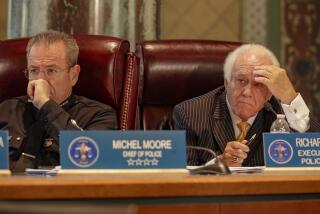Culver City Relaxes Day Care Restrictions
- Share via
Culver City residents Linda Beasley and Liz Harter have each been trying to add another six children to their day care homes.
Westside child care professionals estimate that for each slot the two mothers have been trying to open, 100 children have been waiting. And waiting. And waiting.
Beasley and Harter operate day care homes that are licensed by the state for up to six children. The state has since granted them licenses to expand to 12 children, but for more than a year they have been unable to meet the requirements for city permits.
‘I Think We Won’
Last week, they finally got some relief when the City Council voted to loosen its strict restrictions on large day care homes.
“Liz, I think we just won,” said Beasley, 33, as she laughed and hugged Harter in the council chambers.
“It’s been 13 months since I first filed my application,” she added. “And it’s been extremely frustrating until tonight.”
Under state law, the city cannot regulate six-child day care homes, but its requirements for 12-child homes are tough, requiring a $519 application fee; a 16-page environmental questionnaire covering topics such as grading, drainage, sewage flow and use of explosives on the property, and 23 copies of site plans, plot plans and traffic-flow maps.
A staff member even suggested that Beasley and Harter, who earned about $2,000 and $8,000 last year, respectively, hire an architect and title company to ease the application process.
So, when the council ordered staff to streamline the process by reducing fees, shortening the questionnaire and dropping the requirement for an extra off-street parking space, Beasley and Harter celebrated. How much the fees will be and other details will be worked out later.
About two dozen child care professionals came to last week’s council meeting expecting a fight, but the council surprised them when it ignored a staff report advising it to stand by the ordinance and instead granted almost every change suggested.
“The system works, people pay attention,” declared Tim Cockroft, Beasley’s husband, whose letter-writing campaign was largely responsible for getting the ordinance reviewed.
Mayor Richard Brundo said in an interview Tuesday that the city’s requirements are stringent because when the council approved them in September, 1986, members thought they were regulating day care centers, or nursery schools, not day care homes, which are limited to 12 children under state law.
“To ensure that our neighborhoods were protected (from nursery schools), we took the precautions we thought were necessary,” he said. “But a day care home is completely different than a day care center, and we recommended (on Monday) that changes be made accordingly.”
No Permits Granted
Since the strict requirements became law, not one day care home permit had been granted in the city, despite the high demand for such services.
The city may have had another reason to change its law.
“By making the ordinance so restrictive that it’s impossible to meet, what we feel Culver City has done is eliminate an entire category of child care,” said Abby Leibman, an attorney specializing in child care for Public Counsel, a public interest law office sponsored by the Bar Assn. of Los Angeles County and Beverly Hills. “Not only is it restrictive but, in our opinion, it violates state law in several areas.”
For example, the city ordinance requires an extra parking space for each outside worker at a day care home. The garage and driveway cannot be used for this purpose and the space must be at least 20 feet from the front property line and 5 feet from the side lines.
Leibman said this requirement is unreasonable, explaining that because of the way houses and lots are configured in the city, most applicants would have to tear down and rebuild their homes in order to comply.
“State law never anticipated that kind of expense, nor that you would have to change the aesthetic appearance of your home,” she said.
The shortage of day care spaces on the Westside has reached a crisis level, said Judy Bencivengo outreach coordinator for UCLA Child Care Services.
“For every single child care space, there are a hundred children waiting,” said Bencivengo, who refers mothers to child care providers.
The problem, she said, is that the government does not respect the teaching profession and that it is not easy to talk people into a career that has little status and low pay.
She suggested government-subsidized maternity and paternity leaves as part of the solution to the shortage.
The government can either “pretend and play stupid” or realize “that it’s to their advantage not to separate a mother from her children,” she said. “We’re the only industrialized country in the world that has this problem.”
More to Read
Sign up for Essential California
The most important California stories and recommendations in your inbox every morning.
You may occasionally receive promotional content from the Los Angeles Times.










